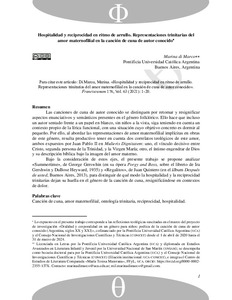Please use this identifier to cite or link to this item:
https://repositorio.uca.edu.ar/handle/123456789/12424| Título: | Hospitalidad y reciprocidad en ritmo de arrullo: representaciones trinitarias del amor maternofilial en la canción de cuna de autor conocido | Autor: | Di Marco, Marina | Palabras clave: | CANCIONES DE CUNA; ONTOLOGIA TRINITARIA; RECIPROCIDAD; HOSPITALIDAD; Quintero, Juan; Gershwin, George, 1898-1937; AMOR MATERNOFILIAL | Fecha de publicación: | 2021 | Editorial: | Bonaventuriana | Cita: | Di Marco, M. Hospitalidad y reciprocidad en ritmo de arrullo: representaciones trinitarias del amor maternofilial en la canción de cuna de autor conocido [en línea]. Franciscanum. 2021, 63, (173). Disponible en: https://repositorio.uca.edu.ar/handle/123456789/12424 | Proyecto: | Oralidad y corporalidad en un género para niños: poética de la canción de cuna de autor conocido (Argentina, siglos XX y XXI) | Resumen: | Resumen:
Las canciones de cuna de autor conocido se distinguen por retomar y resignificar
aspectos enunciativos y semánticos presentes en el género folklórico. Ello hace que incluso
un autor sentado frente a un papel en blanco, sin niños a la vista, siga teniendo en cuenta un
contexto propio de la lírica funcional, con una situación cuyo objetivo concreto es dormir al
pequeño. Por ello, al abordar las representaciones de amor maternofilial implícitas en obras
de este género, resulta productivo tener en cuenta dos correlatos teológicos de este amor,
ambos expuestos por Juan Pablo II en Mulieris Dignitatem: uno, el vínculo decisivo entre
Cristo, segunda persona de la Trinidad, y la Virgen María; otro, el íntimo engendrar de Dios
y su descripción bíblica bajo la imagen del amor materno.
Bajo la consideración de estos ejes, el presente trabajo se propone analizar
«Summertime», de George Gerswhin (en su ópera Porgy and Bess, sobre el libreto de Ira
Gershwin y DuBose Heyward, 1935) y «Regalitos», de Juan Quintero (en el álbum Después
de usted, Buenos Aires, 2013), para distinguir de qué modo la hospitalidad y la reciprocidad
trinitarias dejan su huella en el género de la canción de cuna, resignificándose en contextos
de dolor. Abstract: Lullabies written by a known author are distinguished by returning to enunciative and semantic aspects of the folk genre and modify them, so even an author sitting in front of a white paper, no children in sight, will still keep in mind an utterance situation which belongs to functional poetry, and, therefore, has a very concrete object: to lull the child. Therefore, when addressing the representations of mother-child love implicit in works of this genre, it is productive to consider two theological correlates of this love, both described by John Paul II at Mulieris Dignitatem: one, the decisive relationship between Christ, the second person of the Trinity, and the Virgin Mary; the other, the mystery of the eternal «generating», intimate to God, and his biblical description by the means of the image of maternal love. Considering these main themes, the present article aims to analyze «Summertime», by George Gershwin (in his opera Porgy and Bess, which script was written by Ira Gershwin y DuBose Heyward, 1935) and «Regalitos», a song by Juan Quintero (in Después de usted, Buenos Aires, 2013), to understand how Trinitarian hospitality and reciprocity leave their mark on the lullaby genre, resignifying the songs in contexts of pain. |
URI: | https://repositorio.uca.edu.ar/handle/123456789/12424 | ISSN: | 0120-1468 2665-3834 (online) |
Disciplina: | LITERATURA | Derechos: | Acceso abierto | Fuente: | Franciscanum Vol.63, No.176, 2021 |
| Appears in Collections: | Artículos |
Files in This Item:
| File | Description | Size | Format | |
|---|---|---|---|---|
| hospitalidad-reciprocidad-ritmo.pdf | 357,24 kB | Adobe PDF |  View/Open |
Page view(s)
80
checked on Apr 27, 2024
Download(s)
117
checked on Apr 27, 2024
Google ScholarTM
Check
This item is licensed under a Creative Commons License

